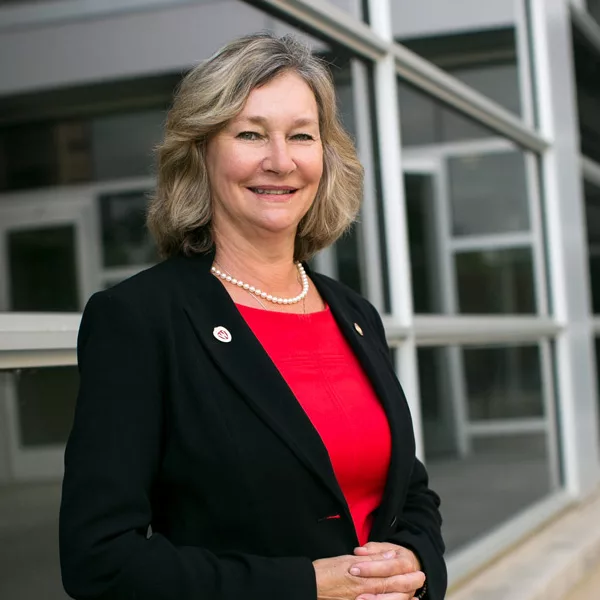A Career Dedicated to Patient- Centered Care
Ask John Drawbert, MD ’80, what accounts for OakLeaf Surgical Hospital’s extraordinary patient satisfaction rankings, and he’ll tell you it’s about being present.
When Susan Isensee, MD ’83 (PG ’86), was named the 50th president of the Wisconsin Medical Alumni Association (WMAA) on July 1, 2016, she knew just what she would do with her two-year appointment.

“Philanthropy is so important,” she says, “I want to continue to find ways for us to have an impact on students where they can feel it right away.”
Fundraising wasn’t initially a role Isensee felt comfortable in. But in anticipation of her 30-year class reunion, she enjoyed successfully challenging her classmates to establish an endowed scholarship in the class’s name. That reunion helped grow engagement with WMAA, another area she would like to continue to work on.
“When you realize that some people can’t go to medical school and contribute to society as physicians due to the cost, it really means something to appeal to your classmates and other alumni. You don’t have to give millions to make a difference,” she notes.
“I also realized that in all the years I had bought tickets to Badger games, I’d given more money to the Athletic Department than to the UW School of Medicine and Public Health!” Isensee laughs.
In fact, she has long supported the University of Wisconsin School of Medicine and Public Health, having served on WMAA Board of Directors and Advisory Board. Recently, Isensee’s involvement has come close to home. Three of the students to whom she presented stethoscopes at the UW School of Medicine and Public Health’s White Coat Ceremony grew up in the Madison neighborhood where she and her husband, Glenn Isensee, raised their two children.
“One student’s mother is in my book club!” she says, adding, “It’s so amazing to see medical students beam when they get their stethoscopes.”
The drive to make a difference seems to have propelled Isensee’s career. Since joining Dean Medical Center in 1986 after completing her family medicine residency in the UW School of Medicine and Public Health Department of Family Medicine and Community Health, Isensee assumed a variety of leadership roles. She served as Dean Medical Center’s chair of recruiting and as site chief for its West Madison Family Clinic. In 1993, she became the first woman elected to Dean Clinic’s Board of Directors. And her commitment to patients earned her physician recognition awards from 1993 to 1996.
However, it was when Isensee observed her first bariatric surgery that she recognized a profound opportunity to make a difference, she explains, adding that Paul Huepenbecker, MD (PG ’86) — who taught her how to tie a knot in medical school — performed the surgery.
Intrigued by the challenge of caring for patients’ post-surgical metabolic changes, she traveled to weight-loss clinics to learn more about treating obesity.
“I looked at my practice and thought, ‘I have a tremendous opportunity to treat this disease.’ And obesity really is a chronic disease,” Isensee notes.
As a result, she and her colleagues established the Dean Comprehensive Weight Management Program in 2005, of which Isensee served as medical director for the program’s first eight years.
The program is unique because it consists of a multidisciplinary team — from surgeons and psychiatrists to dieticians and internists — who support patients through a variety of weight-loss programs. Together, the team approaches obesity treatment as something more than a matter of morality or self-discipline.
“Our clinic is comprehensive in that we have medical and surgical paths for weight-loss programs,” Isensee explains. “Obesity treatment really is about health and not cosmetics because it’s linked to many other diseases such as diabetes and heart disease — and it costs society a lot of health care dollars.”
She continues, “The most touching thing for me is when I explain to a new patient how obesity is a chronic disease and that we’re going to be there to coach, motivate and educate him or her. But I tell patients, ‘I’m not the food police sitting on their shoulder.’”
The relief she senses is palpable. Many patients have told her, through tears, “No one in health care has ever explained all of this to me and not judged me.”
Noting that she thinks even some health care providers have biases against obesity and mental illness, she advocates for teaching all medical students more about these conditions.
As the Dean Comprehensive Weight Management Program’s innovative approach gains national attention, Isensee increasingly has turned her attention to advocacy and education. One of just a few physicians in Wisconsin certified as an obesity medicine physician by the American Board of Obesity Medicine, she served on the Obesity Medicine Association’s Curriculum Committee and Advocacy Committee. In 2015-16, she lobbied at the U.S. Capitol for the Treat and Reduce Obesity Act sponsored by Wisconsin Representative Ron Kind.
While others may see her as a teacher, Isensee remains a diligent student. In 2013, she spent tireless hours at her kitchen table preparing for the obesity medicine board exam, noting that it was the most difficult board exam she’d ever taken.
But hard work comes naturally to this Melrose, Wisconsin, native whose parents sent six kids to college, telling them, “No matter what you do, always do your best.”
This ethic also may explain Isensee’s enthusiasm about supporting the next generation of hard-working students.
“We have so much to be thankful for — including our wonderful careers and this great school that helped us become successful,” Isensee says to her fellow alumni. “It’s time for us to give back and support students so they can take care of us as we retire from this noble profession!”